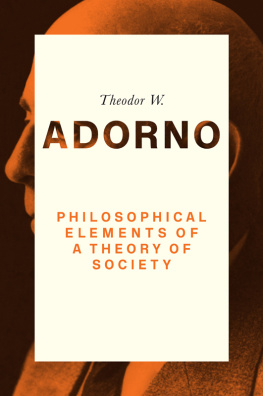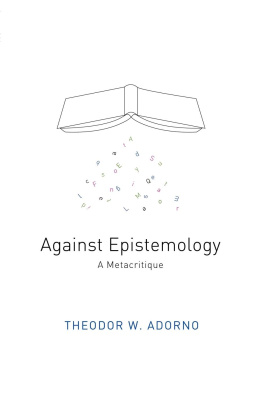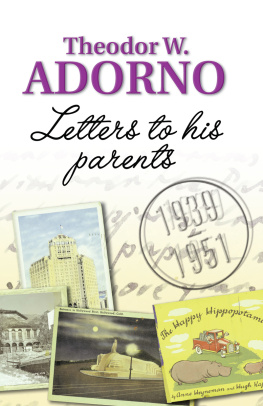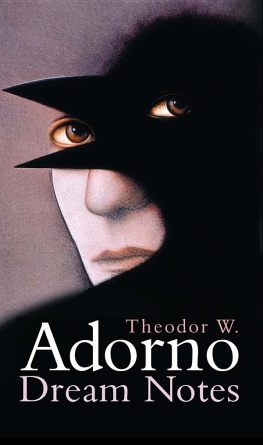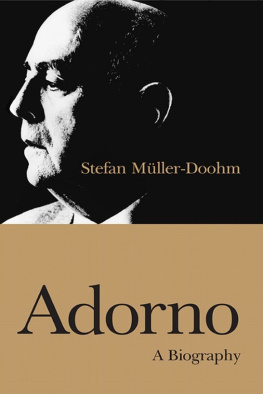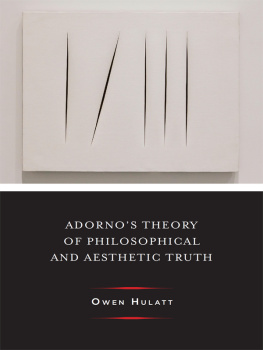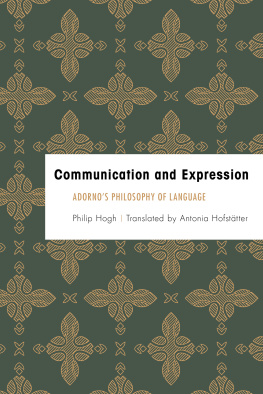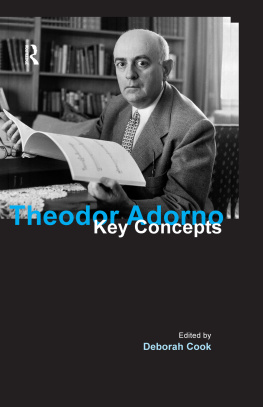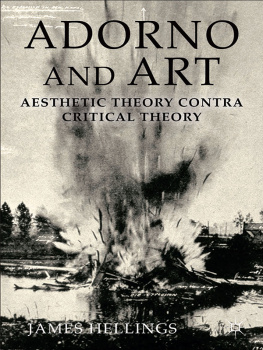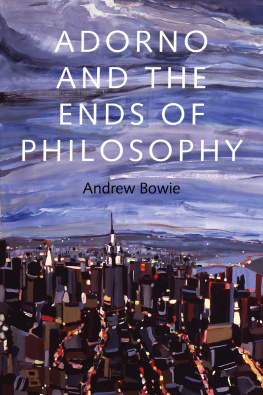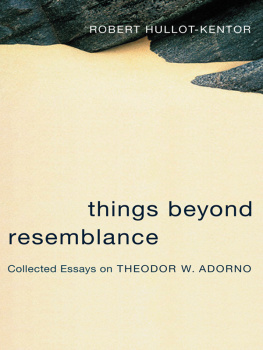
PHILOSOPHICAL ELEMENTS OF A THEORY OF SOCIETY
1964
Theodor W. Adorno
Edited by Tobias ten Brink and Marc Phillip Nogueira
Translated by Wieland Hoban
polity
Copyright page
First published in German as Philosophische Elemente einer Theorie der Gesellschaft Suhrkamp Verlag, Frankfurt am Main, 2008
This English edition Polity Press, 2019
Polity Press
65 Bridge Street
Cambridge CB2 1UR, UK
Polity Press
101 Station Landing
Suite 300
Medford, MA 02155, USA
All rights reserved. Except for the quotation of short passages for the purpose of criticism and review, no part of this publication may be reproduced, stored in a retrieval system or transmitted, in any form or by any means, electronic, mechanical, photocopying, recording or otherwise, without the prior permission of the publisher.
ISBN-13: 978-0-7456-7947-1
ISBN-13: 978-0-7456-7948-8 (pb)
A catalogue record for this book is available from the British Library.
Library of Congress Cataloging-in-Publication Data
Names: Adorno, Theodor W., 1903-1969, author.
Title: Philosophical elements of a theory of society, 1964 / Theodor W. Adorno.
Other titles: Philosophische Elemente einer Theorie der Gesellschaft, 1964. English
Description: Cambridge, UK ; Medford, MA : Polity Press, [2019] | First published in German as Philosophische Elemente einer Theorie Der Gesellschaft, 1964. | Includes bibliographical references and index.
Identifiers: LCCN 2018029142 (print) | LCCN 2018031559 (ebook) | ISBN 9780745694917 (Epub) | ISBN 9780745679471 (hardback) | ISBN 9780745679488 (pbk.)
Subjects: LCSH: Sociology--Philosophy.
Classification: LCC HM590 (ebook) | LCC HM590 .A3713 2019 (print) | DDC 301.01--dc23
LC record available at https://lccn.loc.gov/2018029142
Typeset in 10.5/12 Sabon by Fakenham Prepress Solutions
Printed and bound in Great Britain by CPI Group (UK) Ltd, Croydon
The publisher has used its best endeavours to ensure that the URLs for external websites referred to in this book are correct and active at the time of going to press. However, the publisher has no responsibility for the websites and can make no guarantee that a site will remain live or that the content is or will remain appropriate.
Every effort has been made to trace all copyright holders, but if any have been overlooked the publisher will be pleased to include any necessary credits in any subsequent reprint or edition.
For further information on Polity, visit our website: politybooks.com
EDITORS FOREWORD
The lecture course Philosophical Elements of a Theory of Society is the eighth of fifteen transcribed courses by Adorno. Here, in the context of an introductory discussion of the philosophical traditions on which sociological theory formation rests, he develops a critique of both sociology and philosophy. Adorno emphasizes that theoretical work requires a specific mediation between philosophy and sociology. As well as criticizing the fetishism of method in sociology, which seeks to impose rules on thought, and insisting that theoretical thought about society cannot be formulated simply through empirical findings, he also questions a characteristic of philosophy since the Enlightenment: the urge to create uniform systems that reflect bourgeois rule. Sociology and philosophy must face their own immanent critique thus Adornos postulation. Following on from Marx, he develops philosophical elements of a social theory that break through the compulsion to achieve identity and lack of ambiguity in sociological theory formation in order to make ideas fruitful for critical sociological analysis and theory through an emphatic consideration of unregulated experience. Nonetheless, philosophical reflection always needs sociology too, so that it does not fall for the old idealistic illusion that the totality of real conditions could be grasped through thought alone. The dialectical method of philosophical interpretation must prove itself in relation to the material, the results of sociological research that are placed in different experimental situations and unfamiliar constellations.
The theory of society originated in philosophy whilst, at the same time, it attempts to reformulate the questions posed by the latter by defining society as the substratum which traditional philosophy called eternal essences or spirit. Just as philosophy mistrusted the deceit of appearances and sought after interpretation, so the more smoothly the faade of society presents itself, the more profoundly does theory mistrust it. Theory seeks to give a name to what secretly holds the machinery together. (Adorno, Sociology and Empirical Research, in The Positivist Dispute in German Sociology, trans. Glyn Adey and David Frisby [London: Heinemann], 1976, p. 68)
In working with the transcripts from the tapes of Adornos unscripted lectures, we preserved their oral character. We corrected the transcripts the tape recordings have not survived, sadly only when clarity of content and syntactical structure required it in order for the text to be readable. Accordingly, punctuation marks such as colons and dashes are used more often than would be the case in a fully composed text. Obvious typographical errors that altered the grammar or meaning, as well as incomplete or interrupted sentences, were corrected or augmented without comment whenever there was no doubt as to the intended result. In a small number of cases, and only when they lacked any rhetorical significance, repetitions or uses of such particles as so, well or and were removed. Extensive portions of missing text are marked with [].
On the whole, the quality of the surviving transcripts varied considerably. In Lecture 13 especially, we felt obliged to cut small text fragments because, owing to technical problems with the tape, they were missing a sufficient amount of content to be incomprehensible. In four cases, missing transcripts had to be replaced with notes taken by Hilmar Tillack, which are more summary in nature. As the reader can see from the gaps between the lecture dates which always took place on Tuesdays and Thursdays there are four lectures missing between the second (15 May) and third (2 June) lectures. Two were cancelled because of public holidays, on 19 May (Whitsun) and 28 May (Corpus Christi). It was impossible to establish whether the other two lectures were also cancelled or have simply not survived. Two others are missing between the fourth (4 June) and fifth (16 June) lectures. As Adorno remarks in the text, these were cancelled; the content of Lecture 5 also follows on directly from Lecture 4. Lectures 14 (16 July) and 15 (21 July), which were documented as notes, were swapped in the surviving manuscripts, as Adorno states at the end of Lecture 13 (14 July) that he will expand on the question of system in the next session, which takes place in the notes only in Lecture 15. The notes were therefore integrated into the full text in the correct order.
The explanations in the notes, the index and the overview are intended to serve the readers understanding. The related passages and explanations from Adornos writings clarify some of the oral elaborations, as well as showing the many connections between his lectures and his written work. We have also included explanations of certain theoretical and methodological concepts of authors who are now little known, perhaps even unknown. In order to clarify elements of argumentation that are important for the larger context of the lectures, especially when more expansive questions are only touched on here, these have been quoted at greater length. The overview offers the reader some assistance in finding passages on certain topics.
Next page
